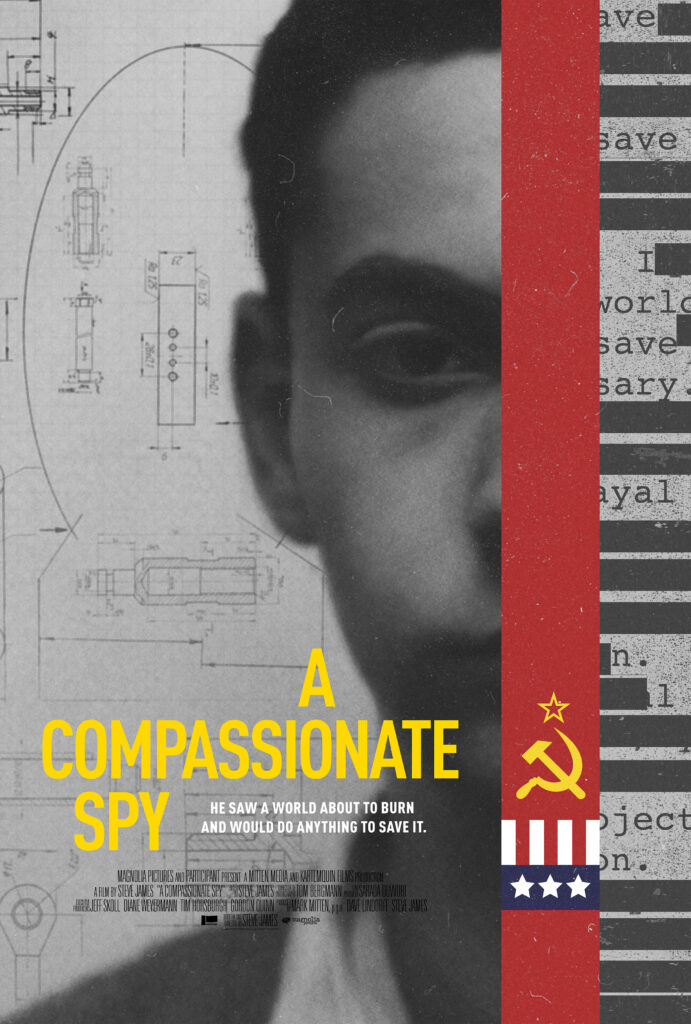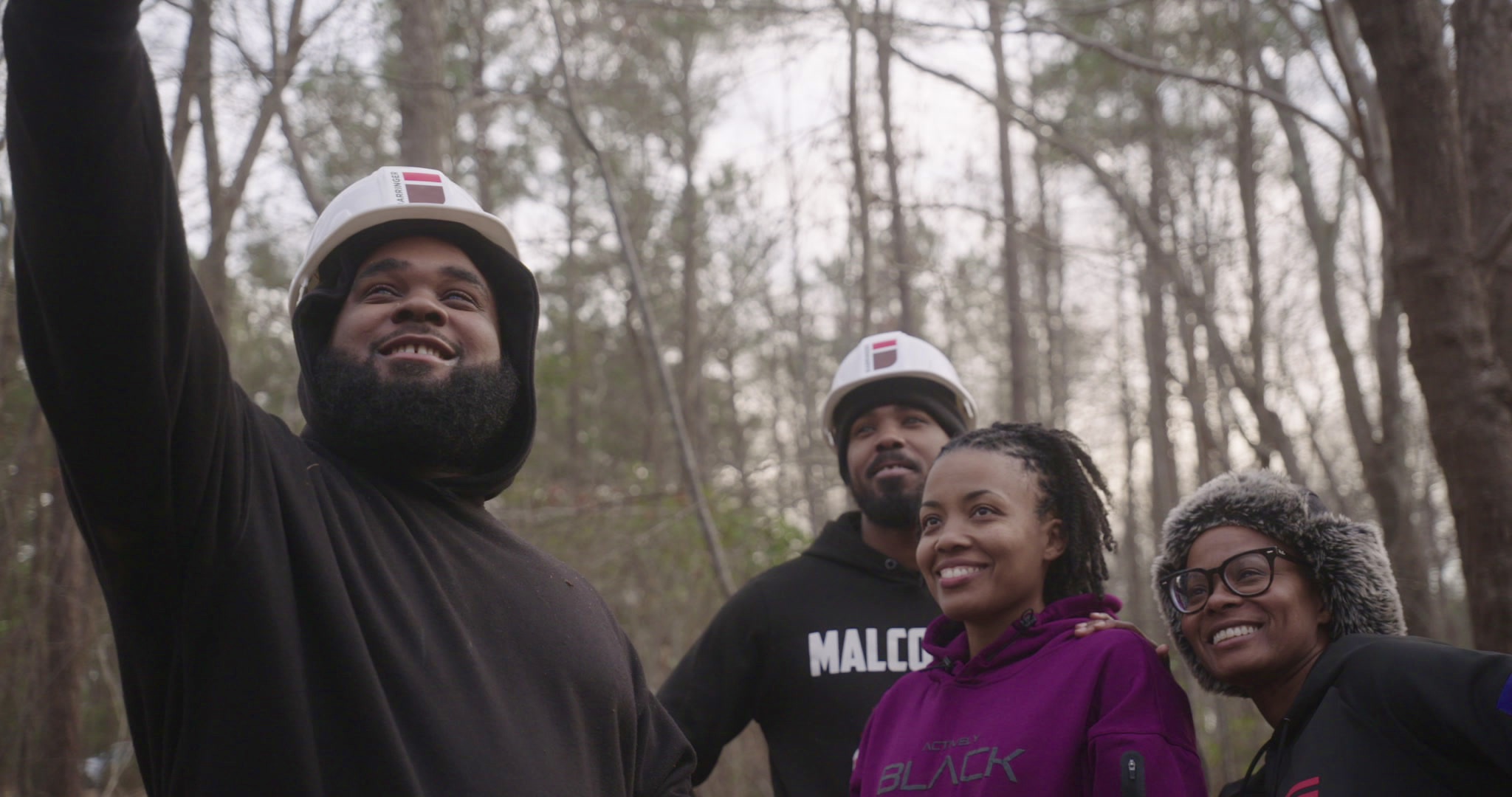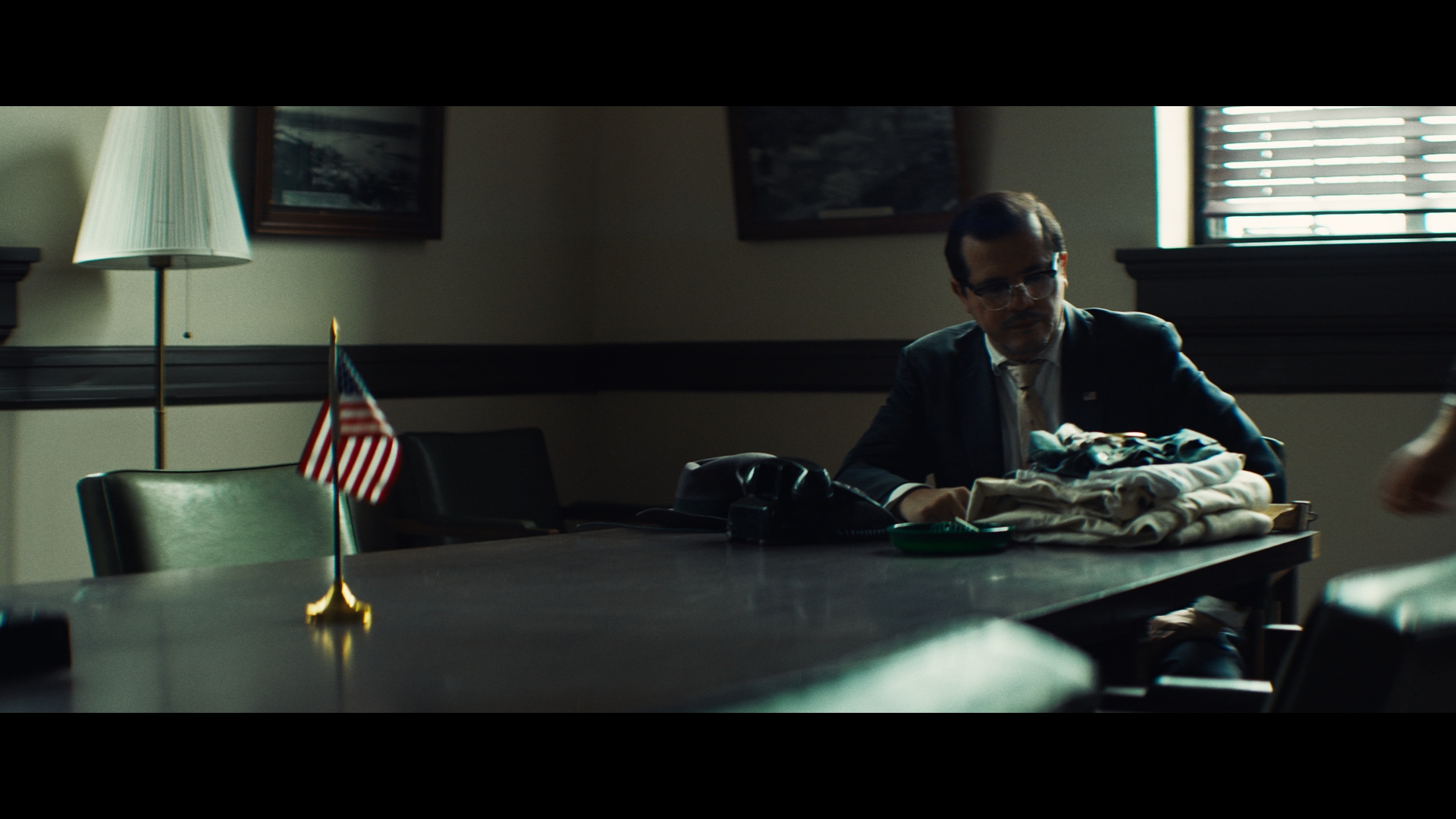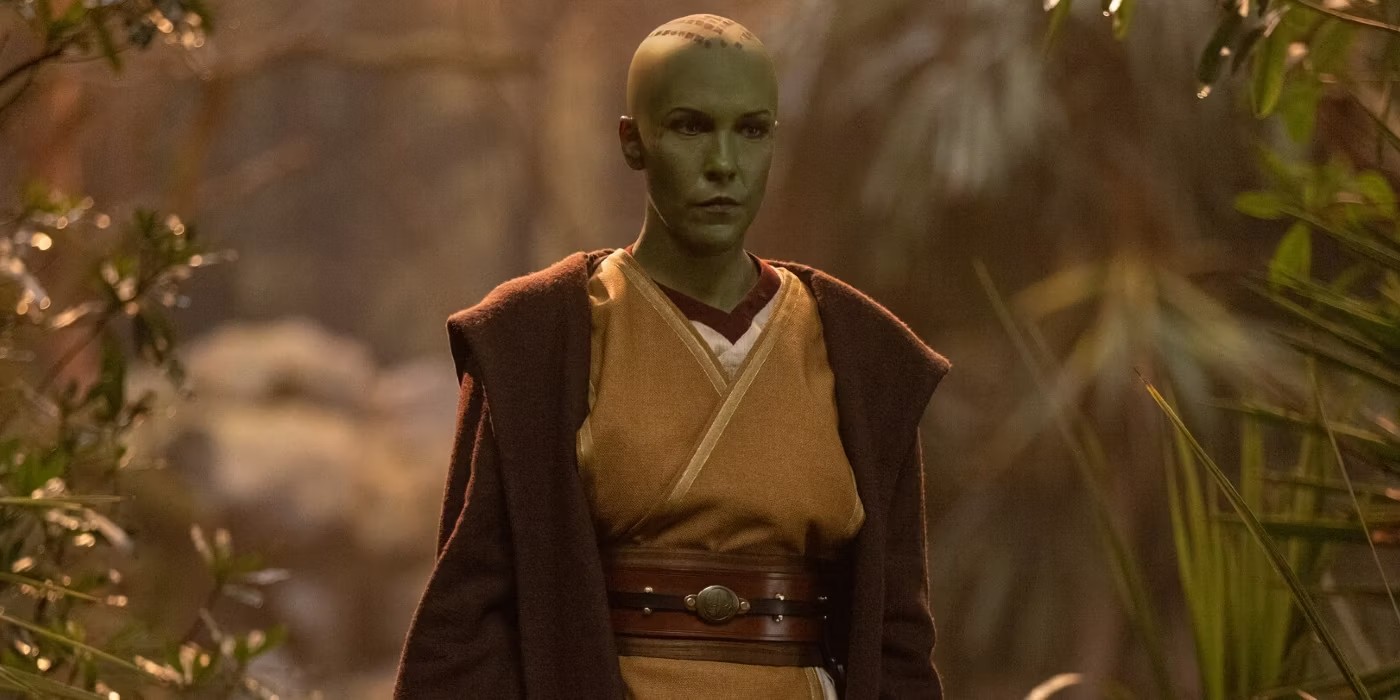A Compassionate Spy brings us the story of the physicist and activist Ted Hall. Hall believed the atomic bomb could cause a nuclear catastrophe and was in touch with the soviet government. A character that ironically did not make the Oppenheimer feature. The filmmaker Steve James brings us his story in Ted Hall’s own words.
The Synopsis
Recruited in 1944 as an 18-year-old Harvard undergraduate to be the youngest physicist on the Manhattan Project, Hall didn’t share his colleagues’ elation after the successful detonation of the world’s first atomic bomb. Increasingly concerned during 1944—with Germany clearly losing the war—that a U.S. post-war monopoly on such a powerful weapon could lead to nuclear catastrophe, he decided beginning that October to start passing key information about the bomb’s construction to the Soviet Union. After the war, at the University of Chicago, he met and married Joan, a fellow student with whom he shared a passion for classical music and socialist causes — and the explosive secret of his espionage. Living under a cloud of suspicion and years of FBI surveillance and intimidation, the pair raised a family while Ted refocused his scientific brilliance on groundbreaking biophysics research. A Compassionate Spy, two-time Oscar® nominee Steve James’ nuanced documentary, reveals the twists and turns of this real-life spy story, its profound impact on nuclear history, and the couple’s remarkable love and life together during more than 50 years of marriage.
For the release of A Compassionate Spy I was connected with the filmmaker Steve James to talk about his latest film. He of course discussed the timing of the documentary release right after the Oppenheimer theatrical success. As well as the subjects, including Ted Hall’s wife, Joan Hall and her experience in getting to watch the film with an audience. As well as covering the side of those against Hall’s beliefs and more!
Nancy Tapia: I was so into this documentary and I couldn’t help but think about the perfect timing for the film Oppenheimer that came out. Did you anticipate this? Was it just part of the stars aligning in the universe?
Steve James: Yeah, I think it’s more of the stars aligning. I mean, we started this film back in 2019, I think before, well anyone, maybe other than Christopher Nolan knew that he was going to do the Oppenheimer film.
So when we learned that he was doing the film, my first thought was, well, that’s really interesting that we’re doing something on this and he’s going to do something, and it’s Christopher Nolan, which is amazing. But I think I assumed back then that, well, of course our film would be done before his, because we were well underway and he had to do a big Hollywood movie. And it turns out he works very fast, haha…
Then I think with Magnolia, our distributor, they decided, and I think wisely, that it would be good to bring our film out on the heels of Oppenheimer coming out. Because I think our hope is that many of the people that watch Oppenheimer are going to be wanting to know more. Even though it’s a three-hour film and gets into a lot, there’s so much more to know and understand and that people’s curiosity and desire to know more will lead them to our film.
Nancy Tapia: It definitely is going to open curiosity. It did for me. The funniest thing is, as an audience, we’re just rooting for the film, but yet not really taking in like we do in the documentary that it was something not so great.
Steve James: No, no, no. No, I know. It’s strange the way a movie can work. It’s sort of like you find yourself pulling for the scientists that you’ve gotten to know and have some empathy for to be successful. It’s easy to forget about what it is they’re trying to create. I think a lot of that happens today with AI. It’s sort of like people are so impressed with the ability to do these things, but that they tend to be more blinded to exactly what it is we’re doing.
Nancy Tapia: Ted Hall is an example of one of the few that was more realistic and saw more than what people saw back in 1944-1945 and after.
Steve James: Absolutely. I think one of the things that really stood out to me from watching Oppenheimer and thinking about our film was that Ted, even at the age of 18 and 19, had a more sophisticated and realistic understanding of the world than I think J. Oppenheimer did.
I think Oppenheimer had convinced himself that this was the only path, the right path, and that
somehow he was going to create a bomb that would bring an end to warfare as we know it, which was incredibly naive. Ted, even at such a young age, perceived a potential future in which it could be an utter catastrophe, and it moved him to act. He wasn’t alone in having these concerns.
Also Read Nicholas Maggio Talks About What Inspired Him To Make Mob Land | Exclusive
I mean, one of the things we made clear in the film is that there were a lot of scientists who shared Ted’s concerns and shared his concern that the Soviet Union wasn’t being included in the research. But Ted was one of the few that made that decision to actually act on that fear and concern and most of the rest of them did not.

Nancy Tapia: I didn’t know about the Rosenberg execution. I learned about it in your documentary, which now with our way of thinking, it was quite brutal. Taking action so quickly.
Steve James: It was huge. At the time, the Rosenberg, Julius and Ethel Rosenberg were arrested and charged with espionage. It was a monstrous international story. There were a lot of people, as our film makes clear, who thought they were innocent and protests mounted to free the Rosenbergs. Ted knew that Julius Rosenberg was, in all likelihood not innocent, but it still was an incredibly tragic thing. And it only reinforced for him and Joan (Joan Hall) just how precarious their lives were and their futures were and that what was potentially at risk if the FBI was able to prove that Ted had done something.

Nancy Tapia: Thank you for bringing up Joan, because she’s quite a character. I love the beginning, where she’s interviewing her own husband, Ted. She’s remarkable. At a moments in the film, I felt like the Compassionate Spy also applies to her.
Steve James: Absolutely. Once I met Joan at the beginning of this project, I wanted to do the film as much for her as to do a film about Ted Hall, to be honest. I was so impressed with her vigor, her memory, her storytelling, her passion, her love for Ted. I just felt like this really is Joan and Ted’s story combined. This is not just the story of Ted Hall.
Nancy Tapia: It’s Like that saying, “behind a great man is a great woman” because there were times where I feel like history could have changed for Ted if Joan had not been by his side and helping [inaudible] him and bringing up some senses.
Steve James: Absolutely. She saved him from himself on several occasions and she was just there for him in the darkest of days. They managed to raise a family and have these extraordinary children despite all of this. It’s kind of an amazing story.

Nancy Tapia: What feedback have you gotten from the family seeing the documentary?
Steve James: Oh, yeah, everyone is happy with the film. Joan passed away about a month ago, unfortunately. But I know from things she said to us and what her daughter said after she passed that she felt very happy that this story had been told about her. Really about her husband, although it’s very much about her too. I think it gave her some peace and comfort in her last year of life. She did get to see the film at a film festival. It was shown at the Cambridge Film Festival in the UK, and she attended it and friends were there. It was a really wonderful chance for her to sort of see the film and be feted by her friends and family.
Nancy Tapia: That’s brilliant! So she got to experience it with an audience.
Steve James: Absolutely. Absolutely.
Nancy Tapia: Well, I’m sure from above she’s applauding it, too.
Steve James: Haha…Thank you.
Nancy Tapia: There was interesting feedback when you showed Sam Cohen responding the opposite of everyone else. Representing the side that did not support Ted Hall’s actions. Can you talk about that?
Steve James: He had very strong feelings. You know there are a lot of people that felt that way about Ted when they found out what he’d done. I’ve even encountered some of them at screenings. Some people will come up, it’s not many, but some people will come up afterwards and just say, I can’t believe you treated this guy sympathetically. What he did was terrible and wrong and needs to be condemned. I understand that reaction. I do understand that reaction. I don’t share it, but I understand it.
Also Read Valentina Herrera And Veronica Rodriguez Talk Ducks In The Slumber Party | Exclusive
I think that for me, what Ted did, he did out of conviction, he didn’t do it out of naivete. Yes, the Soviet Union was not, was a totalitarian state, and Stalin was terrible, and Ted was misled and naive about that. We make that point in the film. But his primary concern was the destabilizing impact that the United States having the bomb to itself could have in the post-war world. I think there’s been plenty of evidence that has come to light, and we bring some of it to light in the film, that his fears were well-grounded, that the United States did enjoy this monopoly on the weapon for about five years. They were not shy about exercising that power with other nations and threatening to drop the bomb and because we had done it twice in Japan, that was no empty threat.

Nancy Tapia: At the end, what do you hope viewers take away from watching this film after also getting to watch Oppenheimer?
Steve James: Yeah, I hope they take a lot away, but I hope what they take away is the sort of courage and conviction that a young Ted Hall had and that his wife had once she met him. He says at the end of the film, he gives advice for the next generation where he says, “We cannot leave these decisions in the hands of the powerful, of the leaders to determine what is done on our behalf. That we have to seize that control and that power ourselves.” I think that’s great advice given all of the challenges that we currently face.
Nancy Tapia: Exactly, he knew those words of wisdom decades ago.
Steve James: Yes.
Nancy Tapia: Well, thank you so much, Steve, for your time. Congratulations on this documentary. It’s very well done.
Steve James: Thank you.
Nancy Tapia: It’s going to come in handy for all of us that have been googling a lot.
Steve James: Yes, thank you. Thanks. Great to talk to you, Nancy. Bye-bye.
Nancy Tapia: Likewise. Have a good day. Bye-bye.
A Compassionate Spy is now available in theaters and VOD
Source: LRMExclusive, Magnolia Pictures & Magnet Releasing

 FOR FANBOYS, BY FANBOYS
Have you checked out LRM Online’s official podcasts and videos on The Genreverse Podcast Network? Available on YouTube and all your favorite podcast apps, This multimedia empire includes The Daily CoG, Breaking Geek Radio: The Podcast, GeekScholars Movie News, Anime-Versal Review Podcast, and our Star Wars dedicated podcast The Cantina. Check it out by listening on all your favorite podcast apps, or watching on YouTube!
Subscribe on: Apple Podcasts | Spotify | SoundCloud | Stitcher | Google Play
FOR FANBOYS, BY FANBOYS
Have you checked out LRM Online’s official podcasts and videos on The Genreverse Podcast Network? Available on YouTube and all your favorite podcast apps, This multimedia empire includes The Daily CoG, Breaking Geek Radio: The Podcast, GeekScholars Movie News, Anime-Versal Review Podcast, and our Star Wars dedicated podcast The Cantina. Check it out by listening on all your favorite podcast apps, or watching on YouTube!
Subscribe on: Apple Podcasts | Spotify | SoundCloud | Stitcher | Google Play




